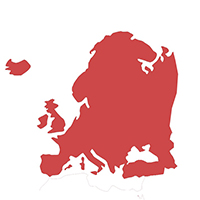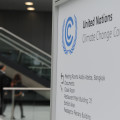COP22: Raining Fossils
Forrest Watkins | November 15, 2016.
When it rains, it pours – even in arid Marrakech. After a week marked with only two Fossil of the Day awards, on the eighth day of UN climate change negotiations civil society groups found three deserving actors to bestow the infamous award: New Zealand, Indonesia and the European Commission.
First place went to the European Union for Tuesday’s “weaky-leaks”: a tentative set of eight pieces of renewable energy legislation that European Commission President Jean-Claude Juncker will release next week. The proposals would do away with renewable energy’s priority access to markets and set a target of 27 per cent renewable energy by 2030, something that is barely above business as usual and is so far unsubstantiated by any binding national targets.
Indonesia’s energy plans proved coal-dependent and codependent this week, earning the second place trophy and leading the nation down a road to rampant pollution. Climate Action Network, which distributes the award, said it supported the country’s wish to add 35 GW of new energy capacity by 2019, but lamented the intended 60 per cent of that capacity that would be generated from coal. It also cited the inclusion of clean coal in Indonesia’s pledge for climate action, calling the technology a “false solution.”
Third in dishonour was New Zealand, caught throwing stones in a glass house of fossil fuel subsidies. The country’s climate change ambassador, Mark Sinclair, spoke Tuesday about the necessity of ending fossil fuel subsidies, perhaps not realising that his own government subsidises oil and gas exploration to the tune of US$33 million. The government there aims to increase the value of oil exports 10 times by 2025, a path that would run clearly counter to climate-safe emissions pathways.
Fossil of the Day is awarded by Climate Action Network (CAN), a network of environmental organisations, to the country or countries they deemed to have played a negative role in the negotiations.













comment